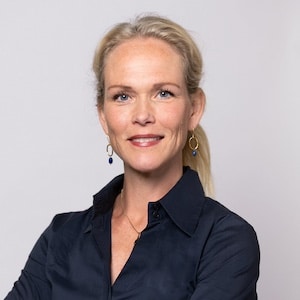Board Talk: ‘Just slowing down will not solve our problems’
We will not make it by reducing alone. A future-proof, sustainable region requires a major system change and talent development also plays an important role in this. Melek Usta and Dick Benschop therefore believe that lifelong learning should be given more attention. "Isn't it crazy that you don't get an enormous dynamic at the MBO and HBO courses from people who are continuously updating their quality and competences?"
The differences between Schiphol and Colorful People are significant. Not only in the nature of the companies – Colorful People is a search and consultancy firm specialized in diversity and inclusion issues. But also in their perception of the past corona year. Where at Schiphol the number of flights more than halved in 2020 and many jobs are at risk, Colorful People had its best year ever. “ I can explain that a bit by our efficiency, which has increased considerably due to corona. We have customers all over the Netherlands and traveled all over the country for this and now many calls are going digital, ”says director Melek Usta. “ But much more important to our growth is what’s going on worldwide: with the Black Lives Matter movement, the Me Too movement. Groups have arisen that say: I don’t accept this anymore. I also want to see my voice and my frame of reference represented in strategic positions in organizations. And we see that there is also an ear for that sound in the boardrooms. I am still curious if this will continue. From 2006 I also had a few heyday years. Drivers said diversity is important and damn what happened? The crisis came, organizations started to reorganize and diversity was suddenly no longer a priority. So I still hold my breath. To what extent does this theme still remain on the agenda?
President and CEO Dick Benschop: “ I actually think that will remain. Those movements that you mention have created enormous dynamics in companies, an enormous necessity to act. I also see that at Schiphol: there is progress, but there is still a lot to do. I am on a management board with three women and one man. And in the layer below, 40 percent are women, even after the reorganization. With the 60,000 people who walk around at Schiphol, I really see the diversity of the region represented, but our own organization is not yet diverse enough. We do, however, pay a lot of attention to awareness of undesirable behavior. There are confidential counselors, we provide training courses micro inequities and how managers can deal with certain situations. ”
Usta: “ It is extremely important that the man or woman at the top of an organization propagates this. That it stands for diversity and says that he or she no longer accepts certain behavior. I am also very happy that the Board has said let us not only look at the hard things throughout the sustainability story, but also at the human side, at social innovation. For example in purchasing: which parties do you work with? What kind of smart interventions can be done there to make those organizations more diverse? Sometimes this is due to very simple things: how your labor market communication is organized. There is a lot of research into how you can use algorithms to ensure that you assess people at the gate as objectively as possible, so that you prevent that from happening with a bias. ”

Melek Usta, Photo: Piet Hermans
What do you think will be the long-term effects of the corona crisis on the region?
Usta: “ There are still a lot of jobs being kept in the air by government regulations, which I wonder if we will still have them after we are all vaccinated. The moment the economy is back at full speed, all the halls and restaurants are full again. I have complete confidence in that. But companies are also going to collapse: a quarter of SMEs have water up to their lips. How long will they last? How do you see that Dick? ”
Benschop: “ I also don’t think we’ve seen the full impact. The scars will get even bigger. So we will certainly not be back immediately when that vaccine is available. Not even at Schiphol. There is a catch-up question: both for companies that want to travel again and for people who want to visit family or on vacation. Then the question is what the long-term behavioral changes are. Our goal of recovery is not growth in itself. We want to restore the connections, but at the same time pay attention to improving the quality of the living environment, to sustainability, for example with sustainable fuel. Building back better is our starting point. ”
Usta: “ I think part of that behavioral change will take place autonomously. But I think we can also steer. Building back better, you say that very nicely. I live in Hoofddorp, close to Schiphol. In the summer it was quite quiet in my garden and as a private e As a person, I also started to think about how sustainable it is to fly to London for 35 euros. I hope that the leaders of our country can sketch an attractive outlook on this – and you are one of Dick’s too, given your important position at Schiphol. What are your thoughts about it? “
Benschop: “ This is a dilemma that concerns us all. My kids are between 17 and 23 and they are hyper-environmentally aware, but also hypermobile at the same time. In my view, this is primarily an innovation task. We cannot place the solution to the climate problem on the shoulders of individual citizens, much bigger leaps are needed. It has been calculated that when in April last year the global economy was largely at a standstill, so at peak lockdown, CO2 emissions were only 17 percent lower than in the same period a year earlier. This shows that moderation alone is not the solution to the problem. We have to change the whole system, we have to innovate, invest in sustainable fuel and in the next step: electric flying, flying on hydrogen. I think we are still amateur, fiddling with. We are big on greening with a ticket tax, but that makes no sense. Fortunately, a fuel mandate has now been issued via Europe for the blending of sustainable fuels. Then we have to get the fuel players to invest. The port of Amsterdam is large in petrol and kerosene, which can also become an energy port for sustainable aviation fuels. We have to make these kinds of developments possible, because it is going to slow down a bit not solve the problem. ”

Dick Benschop
Of course, a lot of time is needed for such major innovations.
Benschop: “ Sure, but it goes fast. Electric flying is already available. In 2030 we may be able to fly from Groningen to Maastricht in half an hour by plane with 30 people. A huge revolution is about to take place. Carlo van de Weijer of Eindhoven University of Technology said it all: in the long run aviation is unbeatable. If you can go from Groningen to Maastricht in 25 minutes, you will not be stuck in traffic or by train. ”
Talent is also needed to develop, devise and implement the innovations required for system change.
Usta: “Yes, and we really have a match to play in there, because we are going down a bit. Even when I look at the quality of our education. The dichotomy you now see is very harmful. ”
Benschop: “I’ve just the documentary Klassen looked. You know it is there, but it makes you think.”
Usta: “ That gap now begins in education. I could turn a dime into a quarter: my mother and father were illiterate. I was able to get this far thanks to the stacking that was possible in the Netherlands. Now come to that. I think we need to make quick progress in two areas. We must ensure that children from disadvantaged backgrounds are well equipped with great teachers in front of the classroom. The other side is lifelong learning. We’ve been saying that for a few decades, but did we really get it off the ground? It is crazy that you are now in secondary vocational education ‘ s and hbo ‘ s not getting an enormous dynamic from people who are continuously updating their quality and competences? It is a pity that we have not been able to accelerate the training of the entire cohorts of people who are currently not doing anything for a job in healthcare. That continuous learning, continuous innovation must become a kind of basic competence that we all learn at school. When you go to study, you don’t have to know what your profession will be, but you have to develop the skills and strength to be adaptive to what is coming your way. ”
Benschop: “ That is the crux. The real resilience you have is the education you have followed and your knowledge and skills. ”
What role can the Board play in this?
Usta: “ I think Board members have a signaling, inspiring and organizing role. We can and must be ambitious. The themes we discussed today are the major themes of our time – sustainability and the need for innovation, talent development, equal opportunities, diversity and inclusion. All these theme‘s touch each other and require cooperation between all stakeholders who are also represented on the Board. I also think that as a region we can make a difference. We are a region with a strong international focus. Let us see our cultural diversity as an opportunity to continue to act strongly in it. I am happy to contribute to that. We must ensure that all students in our region have equal opportunities to develop their talent to the maximum and on the labor market. Organizations in our region must learn to use all that talent, regardless of their origin or background. For example, we still see that many students cannot do an internship. ”
Benschop: “ I think that companies can also put an extra effort into this. We are shrinking as a company, but we have kept our internships also to continue to offer perspective. In two years, the world will look very different again. And Melek, you mentioned something that is crucial in business and actually everywhere: the learning ability of each other. I think that is underdeveloped in the collective sector. Teachers must be able to see each other, the school management must help individual teachers. There are already a few good examples of this, for example Teacher foundation . We have to pay attention to these things. Arrange internships as a company. Not only from a social, but also from an economic point of view. Education and training are the decisive factor for the Netherlands. ”
Board Talk
The interview with Melek Usta and Dick Benschop is part 8 in the Board Talk series. In this series we talk with Board members about the biggest challenges for the Amsterdam metropolis. A region which offers healthy, sustainable living, responsible digitalisation and meaningful work for everyone. These are also the most important themes for the Amsterdam Economic Board. Read more interviews in the Board Talk series.
5 February 2021
Read more about
Contact us
Want to keep up to date?
Get the best regional news and events (in Dutch) via the Board Update newsletter
Share this news
Want to keep informed?
Follow us daily on LinkedIn and sign up for the Board Update newsletter.
Read more
- Preparations for the National Zorginnovatieprijs 2026 by Zorginnovatie.nl are underway, and registration ...
- As CEO of Ballast Nedam Development, Onno Dwars believes in impactful building. ...

